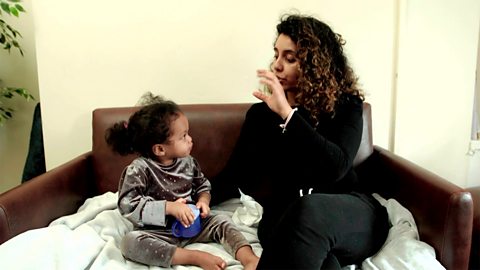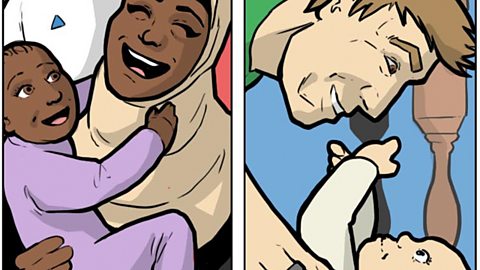Your babyβs communication skills grow a lot in their first year of life.
Before they can even say their first words, babies will learn how to respond to you, express themselves and start forming the mouth shapes they'll need to form words.
As a parent, carer or family member, you have a huge impact on your baby's early learning and language development.
They are listening to you from the moment they are born, so everything you do can help them to learn and make brain connections.
We spoke to Speech and Language Therapist, Sinead Campbell, about some of the ways you can help boost language development.
Watch the video below to find out what they are.
Sinead:
I'm Sinead Campbell. I'm a Speech and Language Therapist.
Try and make your voice sound fun and interesting and use the facial expressions to match.
Young babies pick up on your tone of voice much more than they pick up on the words you're actually saying.
Mum 1:
Yeah, oooh! Where are they?
Sinead:
When your baby is first learning new words, keep it simple, focus on the main word that you want them to hear.
Mum 2:
Bike, blue bike!
Sinead:
Whatever sound your baby makes, copy them!
When they're babbling, babble straight back to them.
They're learning all about communication skills and they're learning how to take turns in conversations.
If your baby is trying to babble or say words, it can help if they don't have a dummy in their mouth.
Try to make sure they have some time without their dummy, as it can affect some children's speech as they get older.
Mum 3:
Shall we take the dummy out?
Good girl, yaaay!
Sinead:
Try playing 'Ready, Steady, Go' games with your baby this can really help build their attention and listening skills.
Mum 1:
Readyβ¦ steadyβ¦
And wait for them to give you a little sign or make a sound before you go, GO and blow the bubbles.
Mum 1:
Έι±π²Ή»ε²ββ¦s³Ω±π²Ή»ε²ββ¦
Sinead's 5 top tips for early language development
All of these tips are really easy to fit into your everyday routine with your baby.
Why not start by trying one each day and working out what works best for you and your baby?
1. Think about your tone of voice
Try and make your voice sound fun and interesting and use facial expressions to match.
Babies pick up on your tone of voice much more than they pick up on the words you're actually saying.
This fun tone of voice is called parentese and it scientifically proven to help your baby's speech and language skills.

2. Keep your language simple
When your baby is first learning new words, keep it simple. Focus on the main word that you want them to hear.
This will probably be when they are around 12 months old.
At this stage, it's important that your child doesn't feel tested. Itβs helpful to just point to and name things. Or even better, see what your child is most interested in and name that.
As they start to pick up the words themselves, you can start expanding your language to include more descriptive words.
3. Copy your baby
Whatever sound your baby makes, copy them!
When they're babbling, babble straight back to them.
This helps them learn all about communication skills and how to take turns in conversations.
By babbling back, you're also helping them link together the noises and the shapes that your mouth makes when you speak.
See the science of responding to baby babble in action in our Speech Lab.
4. Have dummy free time
If your baby is trying to babble or say words, it can help if they don't have a dummy in their mouth.
Try to make sure they have some time without their dummy, as it can affect some children's speech as they get older.
Itβs a good idea to wean babies off the dummy by their first birthday so they can babble and speak their first words.
Get more tips about weaning your baby off a dummy.

5. Play games that build anticipation
Try playing Ready, Steady, Go or Peekaboo games with your baby this can really help build their attention and listening skills.
When you're playing these games, wait for them to give you a little sign or make a sound before you say the final "go" or "boo".
These types of games are also great for teaching your baby about the back and forth of conversation.
Find out more about the science of anticipation games in action.






